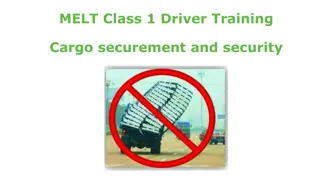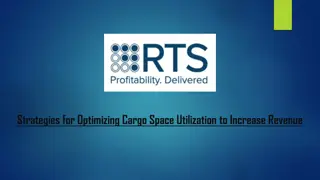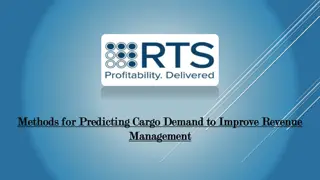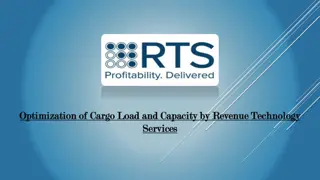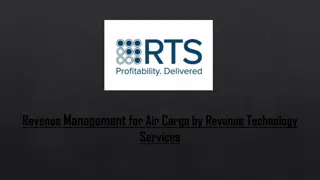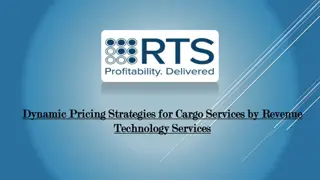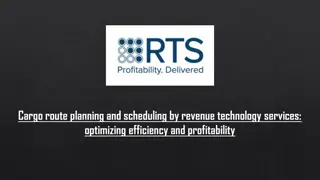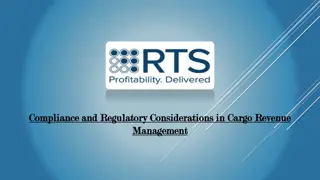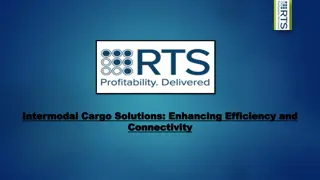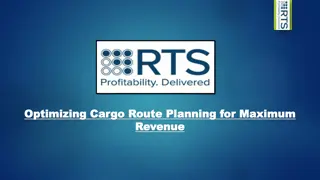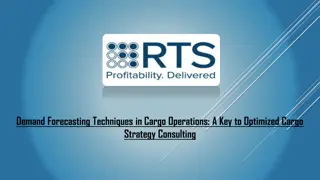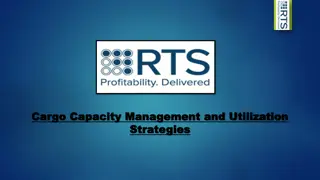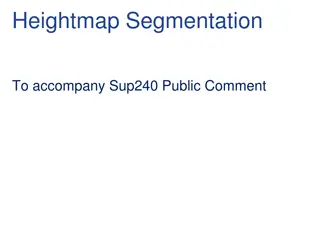Market Segmentation and Targeting for Cargo Services
In the dynamic landscape of cargo services, effective market segmentation and targeting are crucial for maximizing profitability and operational efficiency. Revenue Technology Services s(RTS) plays a pivotal role in advising cargo companies on crafting robust strategies tailored to diverse customer segments. This blog explores the significance of market segmentation and targeting in the context of cargo services, emphasizing the expertise of RTS in cargo strategy consulting.n
Download Presentation

Please find below an Image/Link to download the presentation.
The content on the website is provided AS IS for your information and personal use only. It may not be sold, licensed, or shared on other websites without obtaining consent from the author.If you encounter any issues during the download, it is possible that the publisher has removed the file from their server.
You are allowed to download the files provided on this website for personal or commercial use, subject to the condition that they are used lawfully. All files are the property of their respective owners.
The content on the website is provided AS IS for your information and personal use only. It may not be sold, licensed, or shared on other websites without obtaining consent from the author.
E N D
Presentation Transcript
In the dynamic landscape of cargo services, effective market segmentation and targeting are crucial for maximizing profitability and operational efficiency. Revenue Technology Services s(RTS) plays a pivotal role in advising cargo companies on crafting robust strategies tailored to diverse customer segments. This blog explores the significance of market segmentation and targeting in the context of cargo services, emphasizing the expertise of RTS in cargo strategy consulting. Understanding Market Segmentation Market segmentation involves dividing a heterogeneous market into smaller, more manageable segments based on distinct characteristics and needs. For cargo services, segmentation typically considers factors such as shipping volume, industry verticals (e.g., automotive, pharmaceuticals), geographical locations, and shipping requirements (e.g., perishable goods, oversized cargo). RTS employs advanced analytics and data-driven insights to identify meaningful segments within the cargo industry.
Each segment represents a unique opportunity for cargo service providers to customize their offerings and enhance value propositions. For instance, segments like high-value perishables may prioritize speed and reliability, while industrial machinery segments might prioritize cost-efficiency and specialized handling. Benefits of Market Segmentation Effective segmentation allows cargo service providers to: 1.Tailor Services: Customize service offerings to meet specific segment needs, enhancing customer satisfaction and loyalty. 2.Optimize Pricing Strategies: Set competitive pricing based on segment preferences and willingness to pay. 3.Improve Resource Allocation: Allocate resources more efficiently by focusing on high-potential segments, thereby reducing operational costs.
Targeting Strategies Once segments are identified, targeting involves selecting the most profitable and accessible segments to focus marketing and operational efforts. RTS advises cargo companies on developing targeted strategies that align with the unique needs of each segment. This could involve developing specialized logistics solutions, investing in technology to improve tracking and transparency, or enhancing customer service capabilities. Role of Revenue Technology Services RTS specializes in cargo strategy consulting, leveraging its expertise in revenue management and analytics to optimize market segmentation and targeting strategies. By analyzing historical data, market trends, and competitor behaviors, RTS helps cargo companies identify growth opportunities within specific segments and develop sustainable competitive advantages. Case Study: Cargo Airlines For instance, cargo airlines can benefit significantly from RTS's consulting services. By segmenting their customer base into segments such as e-commerce, perishables, and high-value goods, airlines can tailor their cargo capacity, flight schedules, and pricing strategies accordingly. RTS's analytical tools enable airlines to forecast demand more accurately, optimize cargo load factors, and maximize revenue potential per flight.
Conclusion In conclusion, market segmentation and targeting are indispensable tools for cargo service providers seeking to thrive in a competitive marketplace. Revenue Technology Services excels in cargo strategy consulting by guiding companies through the complexities of segmentation, helping them identify lucrative market segments, and devising targeted strategies to capitalize on these opportunities. By understanding and catering to the unique needs of diverse customer segments, cargo companies can achieve sustainable growth and profitability in the evolving logistics industry. As the cargo services landscape continues to evolve, the partnership between cargo companies and strategic consultants like RTS becomes increasingly vital, ensuring that companies stay agile and responsive to market dynamics while delivering exceptional value to their customers.






